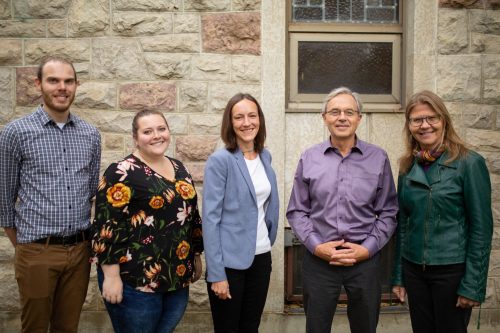The project Consolidating Perspectives on the Nature of Saskatoon’s Evolving Opioid Crisis was a one-year (2018) research effort funded by the College of Medicine at the University of Saskatchewan with in-kind support provided by CRISM Prairies.

James Dixon, Maryellen Gibson, Barbara Fornssler, Peter Butt, Lori Hanson
Led by Principle Investigator Dr. Lori Hanson, (Department of Community Health and Epidemiology) and Co-Investigator Dr. Peter Butt (Department of Academic Family Medicine) at the University of Saskatchewan, the aim of the Consolidating Perspectives study was to bring information and perspectives together regarding the evolving opioid crisis in Saskatoon.
The study addressed three key research questions:
1) What is the current nature of the opioid crisis in Saskatoon?
2) What do key stakeholders perceive as the contextual influences affecting opioid use in Saskatoon? Do stakeholders consider those influences modifiable?
3) How can stakeholders better share information and knowledge of opioid use? What research is needed?
The project began with an extensive literature review on opioid use, which revealed three main themes in this field: observations of the current crisis; influences affecting the nature of the crisis, and scans of current responses. Using information gleaned, the research team conducted interviews with local stakeholders connected to or working within the continuum of care for people who use drugs in Saskatoon and area. Using snowball sampling and direct referrals, 21 interviews were conducted with 24 stakeholders. Additionally, publicly available administrative data on opioid usage from various sources was gathered. During analysis, the research team identified key themes from interviews and summarized them. The administrative data were compiled into a single “snapshot” of opioid usage in Saskatoon and Saskatchewan. These summaries were presented in a discussion document and were shared with interview participants prior to a stakeholder forum that was held October 29th, 2018. A final technical report reflecting the full results of the process is available upon request.
The final summary report released March 2019 is now available for download in pdf format.


